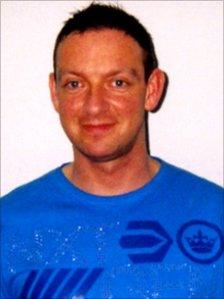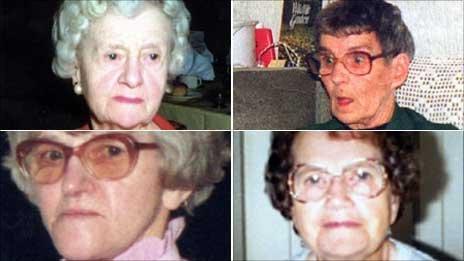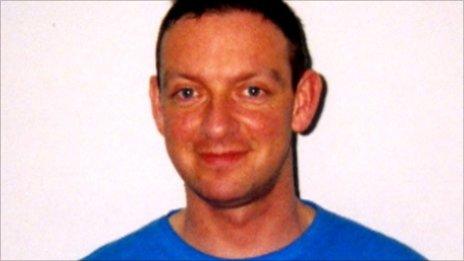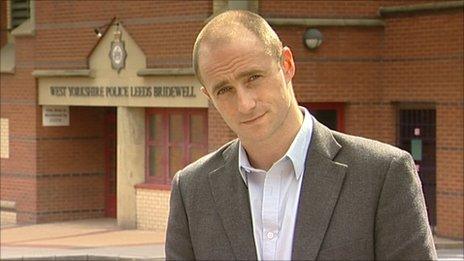'Angel of Death': New evidence in Colin Norris killer nurse case
- Published

Colin Norris was sentenced to 30 years in prison
Fresh evidence has emerged which challenges the conviction of so-called "Angel of Death" nurse Colin Norris.
Norris was convicted of murdering four elderly women and attempting to kill a fifth, by poisoning them with insulin.
The 37-year-old, of Glasgow, has protested his innocence since his conviction in 2008.
The Criminal Cases Review Commission (CCRC) has now been sent evidence of the possibility of hypoglycaemia in older non-diabetic patients.
Two years after BBC Scotland first exposed weaknesses in the prosecution, the new scientific evidence casts further doubt on the conviction.
Norris had been accused of going on a murderous rampage at the Leeds hospitals in which he worked, because he disliked old people.
Despite no direct evidence linking him to any of the patients, he was on shift when they all had similar hypoglycaemic episodes - when the blood sugar drops to dangerously low levels.
Four women, Bridget Bourke, Irene Crooks, Ethel Hall and Doris Ludlam, died - while a fifth, Vera Wilby, recovered from the hypoglycaemic episode, and died later from unconnected causes.

Clockwise, from top left: Bridget Bourke, Irene Crooks, Ethel Hall and Doris Ludlam
None was diabetic. The prosecution argued that spontaneously-occurring hypoglycaemia was so rare that a cluster of five cases must mean foul play.
The jury accepted this, and Norris was sentenced to life with a minimum 30-year tariff.
But BBC Scotland investigated his case and in 2011 produced a programme which cast serious doubt on the conviction.
Off duty
Professor Vincent Marks, a world-renowned insulin poisoning expert, told me at the time that hypoglycaemia in non-diabetics was much more common than first thought.
We also uncovered evidence of other similar cases of hypoglycaemia which occurred in the hospital where Norris worked but while he was off duty.
The programme's evidence suggested there could have been natural reasons for the deaths.
Norris's lawyer believes the cases used against Norris were "cherry-picked' by police. The evidence was submitted to the CCRC.
Now, a new book - The Case of Colin Norris - has uncovered further evidence. It has been co-written by the producer on the programme Louise Shorter and veteran miscarriage campaigner Paul May, and published by miscarriage group Inside Justice.
The new evidence comes from the geriatric medicine department at Rotherham General Hospital and the Bedfordshire and Hertfordshire postgraduate medical school, which has published a review that concludes "hypoglycaemia is not uncommon in hospitalised non-diabetic older people" with other serious conditions.
June Morrison, Norris's mother, has campaigned tirelessly on behalf of her son, and now hopes the fresh evidence will result in the case being sent to the appeal court.
She told me: "People say I brought up a monster. But if I had the least bit of doubt about his innocence I wouldn't be doing what I'm doing.
"I do believe the system will eventually prove there has been a victim of a miscarriage of justice. I do believe that will happen. I've got to believe that."
Science 'flawed'
Paul May, who has worked on some of the biggest miscarriages-of-justice cases in recent times, said: "I chaired the London-based campaign for the Birmingham Six. At the time of their arrest, police said to them 'it's not us, it's the scientists' who stated that some of the Six handled explosives.
"Three decades later, officers used virtually the same words to Colin Norris when claiming he murdered patients in his care with insulin.
"In both cases, the science was flawed. In both cases, the jury was persuaded to deliver guilty verdicts on the basis of erroneous expert evidence."
Former Rough Justice producer Louise Shorter said: "There is no direct evidence that Colin Norris, who before this had not so much as stepped into a police station, hurt anyone.
"The trial was created out of one inadequate blood test from which a case, based on a medical fallacy, was built.
"We now know the medical evidence at trial was wrong. We hope the CCRC will refer his case back to the Court of Appeal before Colin loses too much more of his life."
'Grave doubt'
West Yorkshire Police told the BBC in 2011: "Norris was arrested, prosecuted and on the basis of the evidence presented to the court he was convicted and sentenced."
Norris's campaign team hopes the CCRC will report on his case before the end of the year and refer the case to the appeal court.
From my own perspective, having investigated miscarriage cases for more than a decade - this is one of the most troubling cases I have ever seen.
The central plank of the prosecution is that hypoglycaemia in non-diabetic cases is so rare as to be highly suspicious. The science now casts grave doubt on that claim.
If that plank disappears - the case against Norris is based on very little indeed and must be looked at again.
- Published4 October 2011

- Published4 October 2011
- Published4 October 2011

- Published4 October 2011